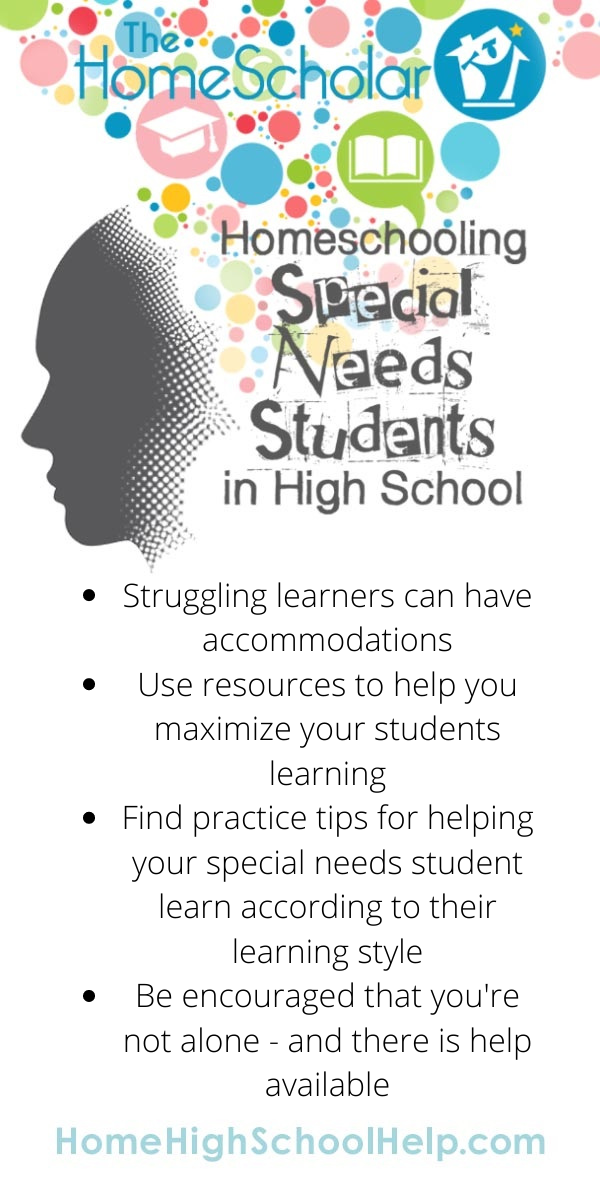Dealing with learning challenges is difficult, but in high school, it can become seriously concerning. You don’t have to be afraid! A parent is a successful homeschooler if their child is performing to the best of their ability. It’s an emotional struggle, best understood by other parents who have faced the challenge of special needs students.
Resources for Helping Special Needs Children
If your special needs child struggles with learning challenges, you are not alone! Read my article College for Struggling Learners to hear about other teenagers with learning problems. These are the resources listed in the article, linked so you can easily access the information.
Learning Disabilities Association of America
Typical learning difficulties include dyslexia, dyscalculia, and dysgraphia – often complicated by associated disorders such as attention deficit/hyperactivity disorder. Learning Disabilities Association
Tips for College Admission
Learning Disabilities – 8 Tips For Effective College Registration For Students With LD or ADD. Read the 8 Tips
Recommendations from Real Homeschoolers
Dr. Raymond Moore, Better Late Than Early: A New Approach to Your Child’s Education. Recommended by my friend Debbie.
Grace Llewellyn’s book, The Teenage Liberation Handbook: How to Quit School and Get a Real Life and Education Recommended by my friend Debbie.
Cynthia Tobias, The Way They Learn Also recommended by my friend Debbie.
Why Wait for a Criterion of Failure by Beth H. Slingerland recommended by my friend JoAnn. (By the way, the Slingerland Institute for Literacy is also recommended by JoAnn. It is a non-profit organization that trains teachers to instruct students struggling with reading, writing, and spelling skills.)
Smart Moves: Why Learning Is Not All in Your Head by Carla Hannaford. Recommended by my friend Joelle. She also recommends the Special Needs Homeschooling blog.
All About Spelling is multi-sensory, approaching spelling through sight, sound, and touch. You can check it out here: AllAboutSpelling.com
If reading is a struggle for your child, you might find LibriVox helpful. It has volunteers record chapters of books in the public domain and release the audio files back onto the net. Their goal is to make all public domain books available as free audio books. The ability of the readers will vary, but the price is right.
In a school setting, children are often given an accommodation for their learning challenges. In the adult world, people learn to compensate for their weaknesses all the time. If you have a child that struggles with writing, you can help them learn to compensate as well.
Dragon Naturally Speaking is speech-recognition software. In a nutshell, you speak into a microphone and the Dragon Naturally Speaking program will type it for you. It says “users the power to create documents, reports and emails three times faster than most people type – with up to 99% accuracy. It includes a free headset microphone with noise canceling technology.”
My husband has tried the software, and had a lot of fun with it. It was too difficult for my elderly parents to use, so it didn’t work for us, but for a computer-savvy teen it should be a breeze. You have to “train” the computer to listen to your voice, and that takes a while to do. Once the computer types what you have to say, there may be some editing involved, but it will be MUCH less work that having a teenager write an entire paper. This program is being advertised heavily right now and a solution for improving grades in the public school. Although I don’t think it is “the” answer, I do think it can really help improve academic performance in non-English areas.
Of course you want to continue your work teaching them to write to their very best. You want them to have the skills necessary to write anything necessary when they don’t have any software available to them. At the same time, using the Dragon Naturally Speaking may make their OTHER learning more enjoyable. They can use it to compose reports or assignments in all of their subject quickly. That way they can succeed in history, economics, science, and other subjects, without being penalized for their weaknesses in the area of English. That can improve their love of learning, and lead to a better educated child in the long run.
Sometimes, you just need some quick, practical ideas on how to help your child. You can find some practical ideas in this article on my site. Also, this article from Porch.com gives some great tips for homeschooling special needs kids of all ages.
Encouragement for Helping Special Needs Children
If you need more encouragement, read my article Homeschooling at Peace Inside the Bell-Shaped Curve. I’ll explain what the bell-shaped curve looks like from different learning perspectives so you can see how it may impact your day-to-day life and social interactions. I think you’ll not only find it encouraging, but helpful.
If you need personal help in how to help your special needs child, consider joining the Gold Care Club. Inside the Gold Care Club you’ll not only get great resources to help you, but you’ll get one on one time with me each week to talk through the struggles your family may be dealing with. I’m here to help!




